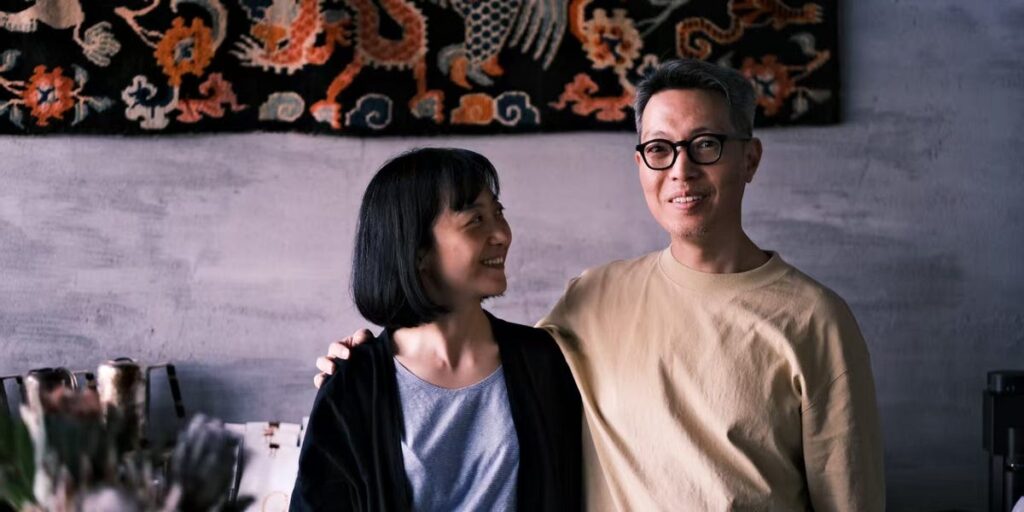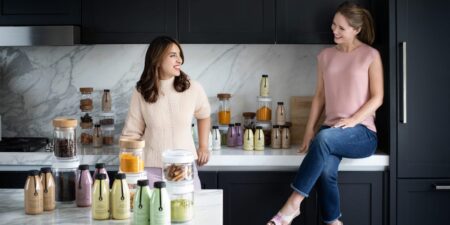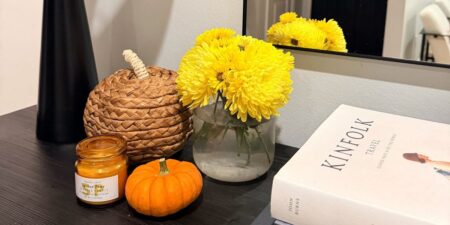Before he was running a kombucha café in Beijing, Ki Won Yoon was studying the universe’s origins — and swiping right on the woman who would become his partner in life and business.
Six years ago, Yoon was a Stanford research scientist shuttling between California and Beijing, studying the faint radiation left over from the Big Bang. While in Beijing, he matched with Shu Yu on Tinder. They bonded over a shared love of tea.
When the pandemic grounded flights in 2020, Yoon caught a plane out of California. After a decade at Stanford, he decided it was time to start over. “I felt I had to spend the next part of my life doing something radically different,” Yoon, now 48, told Business Insider.
Born in Seoul and raised in Los Angeles, Yoon studied astrophysics at UC Berkeley and earned a Ph.D. at Caltech before joining Stanford in 2010.
His move to Beijing wasn’t just about leaving academia. “The main reason for the physical move was to be with my partner,” he said, adding that the career shift “had probably been brewing for a few years.”
Finding common ground
Shu, now 39, had built her career running a creative studio. With Yoon, she started an online store selling boutique teas and teaware. But the more the couple worked together, the more their dream expanded — they wanted a space large enough to ferment their own kombucha.
One evening, while dining at a Vietnamese restaurant they frequented, Shu had a thought: Why not here? The spot already had a coveted food license — a rarity in Beijing’s historic districts.
Yoon said the couple avoided outside investors, instead raising about 1.5 million yuan, or around $200,000, from friends in the first four months of 2024, offering ownership stakes in return. Nearly half of that money went toward renovations and equipment, he said. In October, they secured an interest-free loan of 300,000 yuan and took out another 150,000 yuan earlier this year.
Renovation wasn’t easy. “We gutted the entire place all the way down to the underground plumbing, then built it back up from scratch,” Yoon said. The space now includes a gallery, a fermentation lab, and a kitchen.
Opening up shop
010 Beijing Natural opened at the beginning of this year, five years after Yoon’s move. Though tea was the foundation, the café quickly expanded into coffee, sake, chocolate, tasting menus, and naturally fermented wines. They also began hosting art exhibitions. “In the end, it’s about the underlying aesthetic experience beyond the consumption,” Yoon said.
The model appears to be working. In July, 010 brought in 300,000 yuan in revenue, enough to be modestly profitable. Rent on the 2,000-square-foot space, including an outdoor courtyard, costs 34,000 yuan a month.
Shu described the couple’s lifestyle as tang ping, or “lying flat,” the Chinese trend of rejecting relentless work culture. “We just wanted to drink tea and eat every day, and that’s how it came together,” Shu told Business Insider in Mandarin.
They’re also part of the functional drink trend — beverages marketed as offering health perks beyond hydration, like energy, gut health, or immunity. Last year, nearly one in four functional beverage launches came from the Asia-Pacific region, with China accounting for 15%, according to Innova Market Insights.
Linda Zhang, a Google data analyst and host of “Ascent,” a podcast on fast-growing Chinese companies, said kombucha could help reach a niche audience willing to spend on both drinks and art.
“Average spending on restaurants and drinks seems to be going down,” Zhang told Business Insider. Hybrid models “make a difference,” she added.
In 2024, nearly 3 million restaurants in China went out of business as consumers cut down on eating out, according to business data analytics firm Qichacha. According to Beijing’s Bureau of Statistics, restaurant spending fell 3.6% year over year in the city from January to July.
Shu and Yoon’s café is betting that a blend of tea, art, and community can withstand those challenges.
Work is now life
When it comes to running the café, Shu and Yoon don’t have strict roles. “I like to turn things I enjoy into something that can be shared,” Shu added that she’s spontaneous, initiating new ideas and collaborations.
Yoon, by contrast, zeroes in on the process. “He’s a demanding person to work with,” Shu said. “He’s always observing people and correcting mistakes immediately.”
Open four days a week, the café often runs past midnight. Yoon said that in July, six young opera singers had dropped in, ordered nine bottles of wine, and stayed until 2 a.m. “When you see people having a lot of fun and enjoying the space, you’re more than happy to stay late,” he said.
They both consider time management and energy levels their biggest challenges. “There seems to never be enough of either to do everything we want,” Yoon said.
On a recent Saturday, Business Insider visited 010 Beijing Natural.
Guests filtered through the understated entrance. Tibetan carpets hung on the walls for an exhibition; fashionably dressed customers ordered kombucha and beers. A tree in the front yard became a photo spot for couples, while groups lingered over drinks in the backyard.
Yoon poured kombucha flights in vintage Scandinavian glassware — two half glasses for 50 yuan. He said they often sell out of kombucha brewed from yan cha, an oolong tea grown in the mineral-rich mountains of Fujian.
The food menu featured savory bites such as Sichuan pepper sausage and cuttlefish dumplings, with desserts like a yak butter madeleine and dark chocolate pudding. All were served on red Japanese lacquerware.
Despite his scientific past, Yoon now spends much of his time socializing with customers and collaborators. He learned Mandarin on the job, coordinating renovations with workers who spoke no English. Now, he’s conversational but relies on Shu for more complex exchanges.
Looking back, Yoon says he has no regrets about leaving academia. “I knew it wasn’t just a career break,” he said. “It was a jump into the unknown.”
Do you have a story about moving to Asia that you want to share? Get in touch with the editor: [email protected]
Read the full article here
















